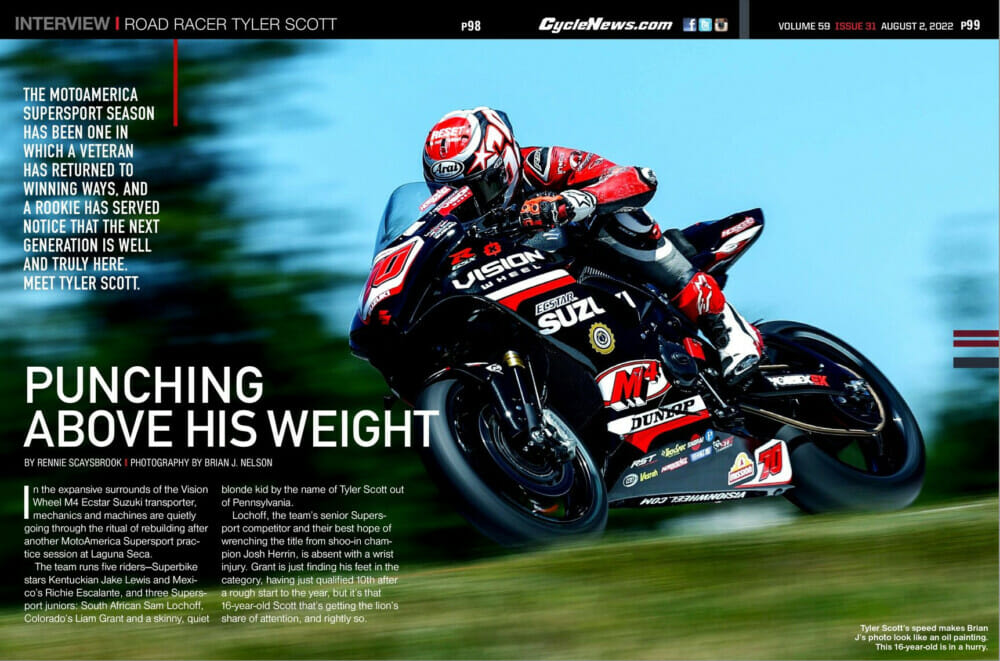Rennie Scaysbrook | August 5, 2022
The MotoAmerica Supersport season has been one in which a veteran has returned to winning ways, and a rookie has served notice that the next generation is well and truly here. Meet Tyler Scott.
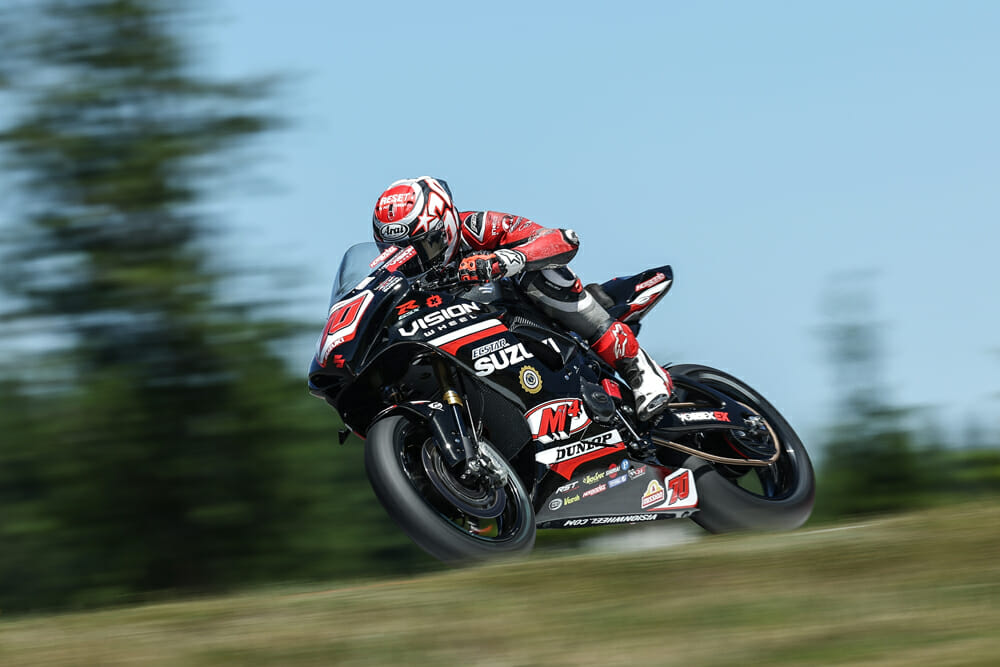 Tyler Scott’s speed makes Brian J’s photo look like an oil painting. This 16-year-old is in a hurry.
Tyler Scott’s speed makes Brian J’s photo look like an oil painting. This 16-year-old is in a hurry.
Photography by Brian J. Nelson
In the expansive surrounds of the Vision Wheel M4 Ecstar Suzuki transporter, mechanics and machines are quietly going through the ritual of rebuilding after another MotoAmerica Supersport practice session at Laguna Seca.
The team runs five riders—Superbike stars Kentuckian Jake Lewis and Mexico’s Richie Escalante, and three Supersport juniors: South African Sam Lochoff, Colorado’s Liam Grant and a skinny, quiet blonde kid by the name of Tyler Scott out of Pennsylvania.
Lochoff, the team’s senior Supersport competitor and their best hope of wrenching the title from shoo-in champion Josh Herrin, is absent with a wrist injury. Grant is just finding his feet in the category, having just qualified 10th after a rough start to the year, but it’s that 16-year-old Scott that’s getting the lion’s share of attention, and rightly so.
The Russian-born Scott, who made America his home after being adopted at age one, has just stuck his next-gen GSX-R750 on pole, 0.383 seconds up on Herrin’s bespoke Panigale V2. It’s a remarkable performance from a kid who last year took the only single-cylinder machine in the Junior Cup, the KTM RC390, to the national championship against a sea of Kawasaki Ninja 400s.
Scott’s raw speed, allied with an uncanny ability to stay on the motorcycle for a person his age, has been one of the highlights of MotoAmerica 2022. He’s already taken a Supersport win in race one at Road America, and had it not been for Herrin’s reborn rampage, would be standing on top of the points tally.
We caught up with the articulate young Scott just before race one at Laguna Seca, where he played cat and mouse with Herrin to take another podium, second place, in his very young career.
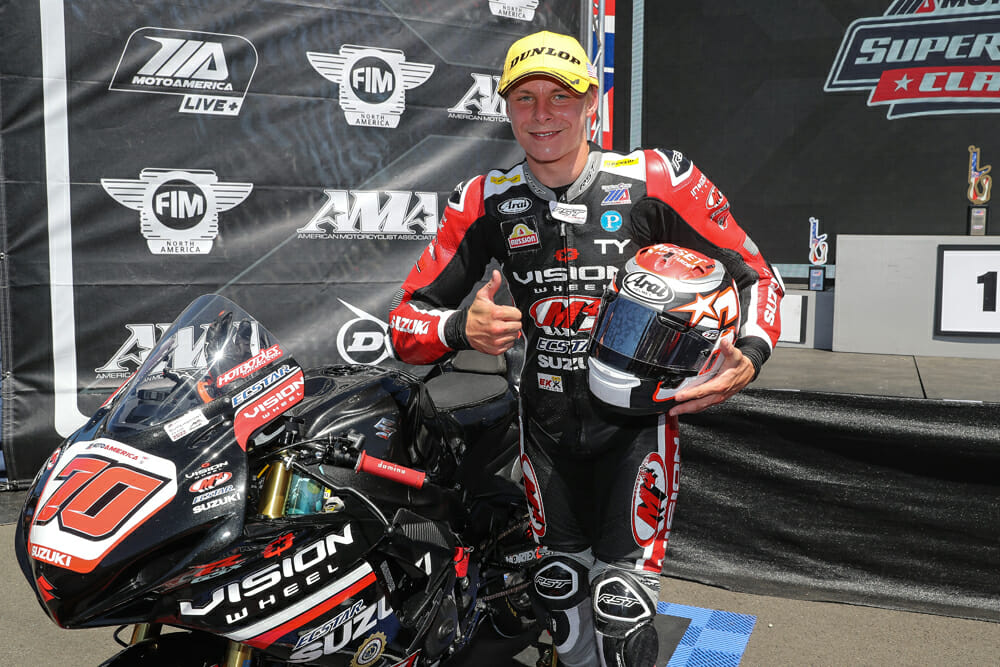 Podiums have been coming thick and fast in 2022 in his first year on the Supersport machine.
Podiums have been coming thick and fast in 2022 in his first year on the Supersport machine.
Who exactly is Tyler Scott?
I was adopted from Russia when I was less than a year old. My dad, Mike Scott, used to race flat track. He did some road race, too. In his later days, he did drag racing. He’s the guy that started it all for me.
When I was little, he would ride me around on a 50 a couple hours a week. I loved it. Then when I was about three, he gave me a PW50. I started learning on that. I couldn’t race until I was four, and then I started doing flat-track races. I did quite well right off the start, winning a few races. I was solely just flat track until I was about eight. Then I went to New Jersey for MotoAmerica, and we saw this little exhibition with the stunt guys of little kids doing circle road-race drills on the asphalt. We were like, “That’s pretty cool. We should go try that.” So, that’s kind of where my road-racing career started, with the New Jersey Mini GP up there.
Where do you live?
Pennsylvania. I started up there with those guys, they kind of gave me the base in road racing and taught me everything up until the point where I was 10, and then I could start doing track days and WERA.
I still always did flat track in the background, and I still do. I’m quite competitive, too. I went to a pro AFT race earlier this year, and I was in a podium position, and I just had a mechanical.
So, once I started getting on the bigger bikes, I liked it more and more, mainly because the time you get in flat track is very little. You do six laps on a short track and, it’s like, two minutes. When I first got introduced to road racing, I loved the time that I got. When I got on the faster bikes, I just loved it more and more. Flat track was always on the same level. I just kept moving up. At the end of 2018, we got an invitation to Spain for the Red Bull Rookies Cup. We went there not thinking too much of it.
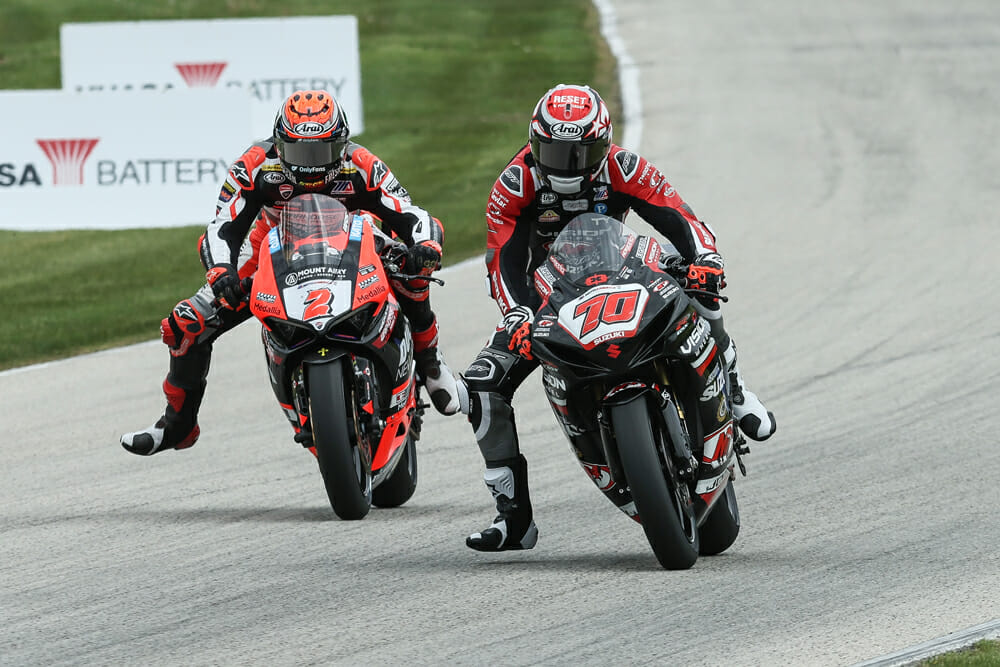 Scott upped the ante by taking a career-first MotoAmerica Supersport win in race one at Road Atlanta, surprising everyone but himself.
Scott upped the ante by taking a career-first MotoAmerica Supersport win in race one at Road Atlanta, surprising everyone but himself.
What circuit was that?
I don’t know. It wasn’t a big GP track [Guadix venue in southeast Spain, Ed.]. It’s almost like a borderline cart track. There was two days there and you had to make it out of the first day. There were a bunch of fast Americans—myself and Gabriel DaSilva made it out of the first day, and the second day, in the last session, I dropped a bunch of time. That’s what got me the ride for 2019.
In 2019, I did the Red Bull Rookies Cup partnered with the Lagasse team for the Spanish CEV FIM series. I partnered with them and had some mechanical issues and had some bad crashes, which mentally really set me back. Then I didn’t get the ride in 2020 for Red Bull Rookies Cup. Rocco Landers got it, but he only did one race, and he didn’t do that well.
In 2020, I did the Spanish series again, but on a different team with the Honda NSF250, which I had been previously riding in the States. I learned so much more again in 2020 and got a best finish of 15th—that’s huge over there when there’s 60 kids within two seconds.
I took that from Spain, all my knowledge, and came back to America and won 11 out of 16 races and took the Junior Cup Championship on the KTM. We were kind of worried the beginning. We knew Alex Dumas ran it [the KTM] in 2018 and won, but then they put so many restrictions on it at that point and KTM wasn’t really wanting to come back.
We had this opportunity to race the RC and we weren’t sure if it was going to be competitive. We won the very first race. So, it was a fun year battling with Ben Gloddy before he went to the twins.
It was a good year. No DNFs, never crashed the bike during the season. We had one pre-season crash, but overall, it was pretty much a perfect year.
We didn’t know what we were going to do for this year. I didn’t want to go to Twins Cup. I had offers, but I didn’t really want to go. So, I thought it would be better to just go straight into Supersport.
We made a KTM Duke 790 into a road racer with sportbike body work—that thing was pretty cool, but the way you had to ride it was a lot different than the 600. I felt twins would set me back for any further progression in the series. It would be harder to get used to the bike. So, we were going to build a Yamaha R6 ourselves. Then, last minute, John and Chris Ulrich gave us an offer to be on the team and we took it.
“I took that from Spain, all my knowledge, and came back to America and won 11 out of 16 races and took the Junior Cup Championship on the KTM.”
As far as the transition to 750, what were your initial thoughts when you got on that bike? You would have been a little bit leaned in with the 790.
The 790 had a lot of torque, which was kind of familiar to the 750, but the riding style of the 790 was a lot different. I don’t know if it set me up or hurt me a little bit. I think the thing it did help with was the speed, the braking and getting used to that closing speed. I think that was the big thing with the 790. It was a smooth transition in Atlanta, but I actually didn’t have the 750 until VIR. I raced the 600 and had one DNF.
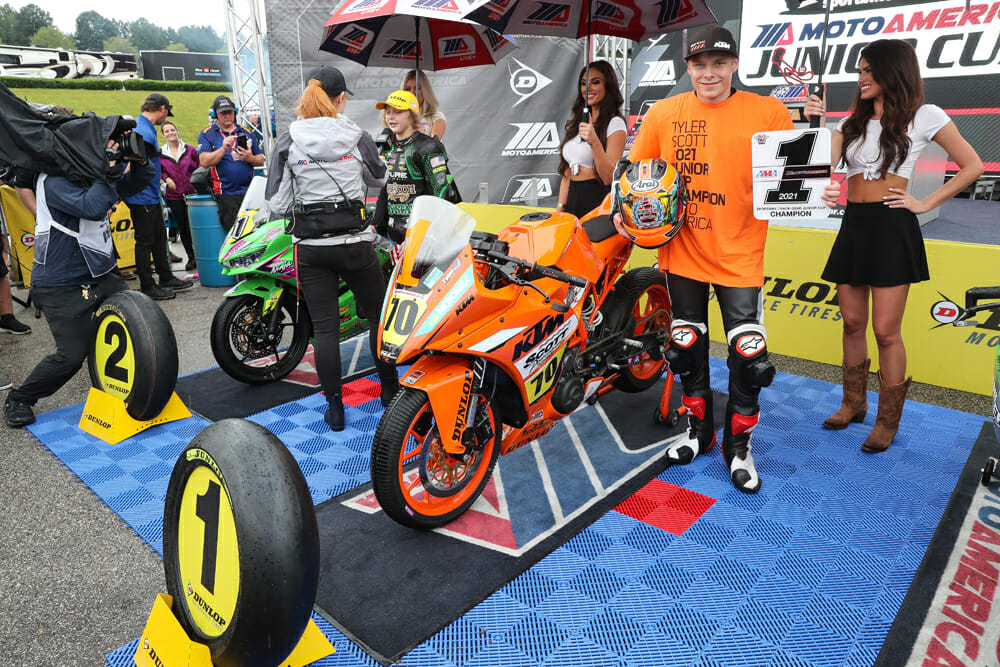 The Junior Cup Championship came via a single-cylinder KTM against a sea of twin-cylinder Kawasaki Ninja 400s.
The Junior Cup Championship came via a single-cylinder KTM against a sea of twin-cylinder Kawasaki Ninja 400s.
How did it feel to get on the box at Road America?
Road America was my first win of the year, which was cool. It’s been a smooth year. We’ve had a few crashes, some DNFs just from dumb stuff happening. Atlanta, I just got kind of chopped off at the top of a hill—sort of taken out, sort of my fault. I got pushed wide by Herrin. He didn’t take me out, but he sent me so far off the line that when I got back on the line I just spun around, no throttle, no brake.
Looking back, I definitely, as the rider, could have done stuff a little bit differently so it didn’t happen. But we moved on. We’re just trying to progress more and more as the season goes on.
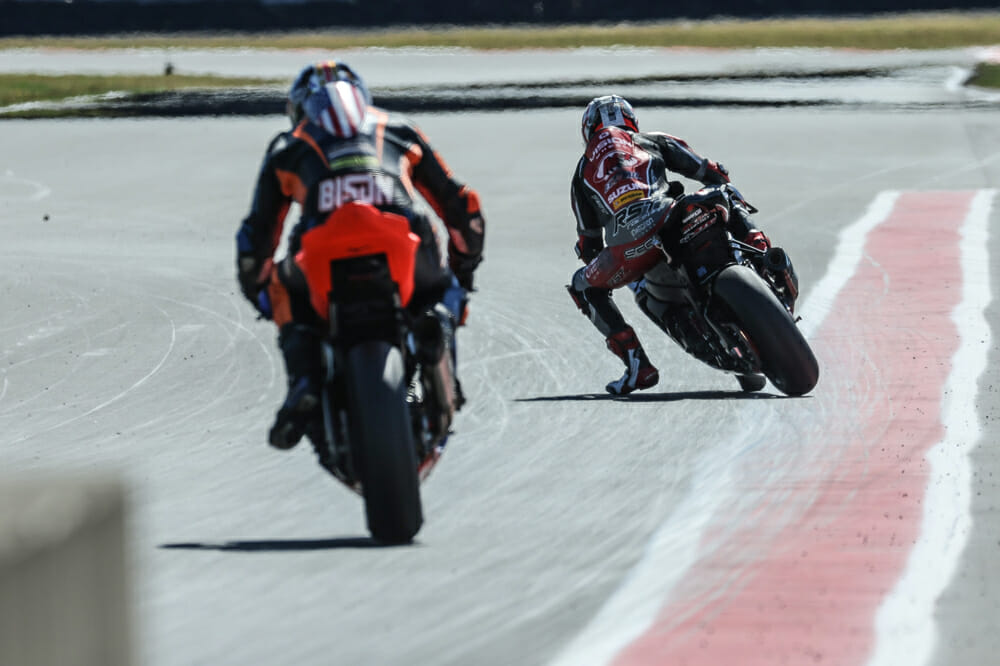 Obviously, Scott’s flat-track heritage hasn’t hurt his adaptation to road racing.
Obviously, Scott’s flat-track heritage hasn’t hurt his adaptation to road racing.
What is your goal as a rider now? Where do you realistically see yourself?
I don’t know. I would just say MotoGP. I feel like Sean Dylan Kelly is a good example of that. He came out of this team and got a deal with American Racing. I feel like this is the only passageway from America to MotoGP. So, I feel like I’m in a good spot for some opportunities.
Have you still maintained contact with any of the Spanish guys that you raced with?
No.
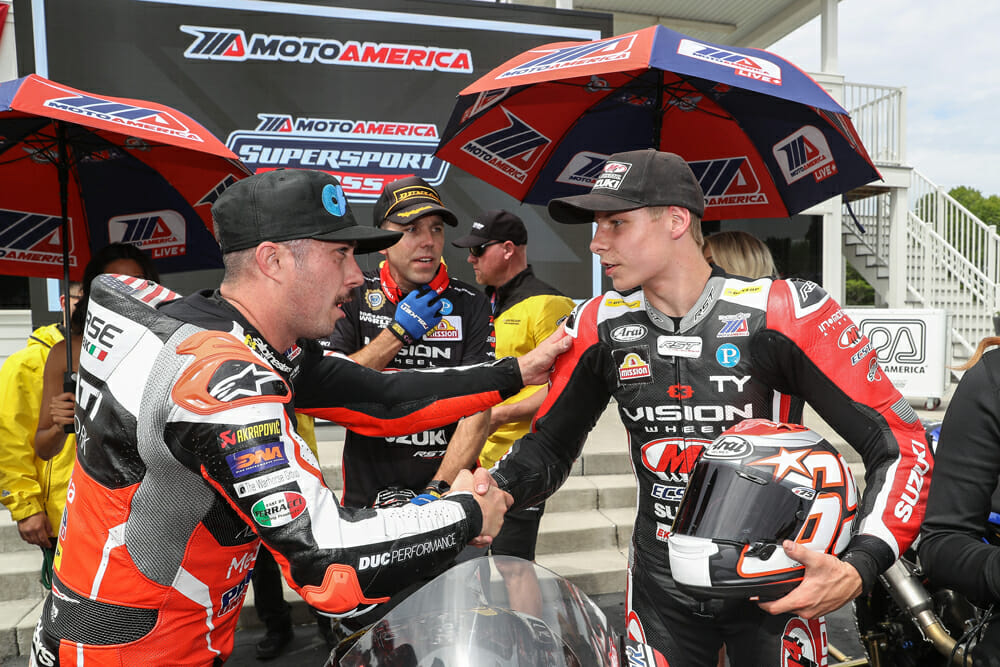 Old versus new. Josh Herrin (left) said at Laguna Seca he’s the same age difference to Scott, just in reverse, as his own one-year-old son is to Scott. Talk about a generational change.
Old versus new. Josh Herrin (left) said at Laguna Seca he’s the same age difference to Scott, just in reverse, as his own one-year-old son is to Scott. Talk about a generational change.
How was coming in as a foreigner and riding in those teams?
On the Spanish teams, it wasn’t all that bad, but in the Red Bull Rookies Cup, there was definitely some favoritism. Not necessarily of the guys that ran it, but more the suspension guys and the guys that actually did stuff to the bikes. It was a big learning experience. I didn’t take many results. My best was 11th in Assen, which was cool. I just took the experience I could from that year and moved on and got a little bit smarter about stuff.
“I feel like I’m in a really good spot for some opportunities.”
Was your dad over there with you?
In 2019 my dad was with me at every race. In 2020, my mom started coming. I knew what to do in the airports and stuff, and I knew the flow of what to do. So, it was easy when she came over, just so my dad—we have a motorcycle dealership—could stay at the business.
It was a busy couple of years because during Covid, people were getting the checks and stuff for $1200 and coming into the shop. Motorcycles were going out the door, especially the little Chinese ones for like $800. Just hundreds of them.
In Spain in general it’s just a whole different level. I didn’t get the results, really. But I took a lot of experience from it. Now I feel like I’m in a comfortable position to turn that experience into results.
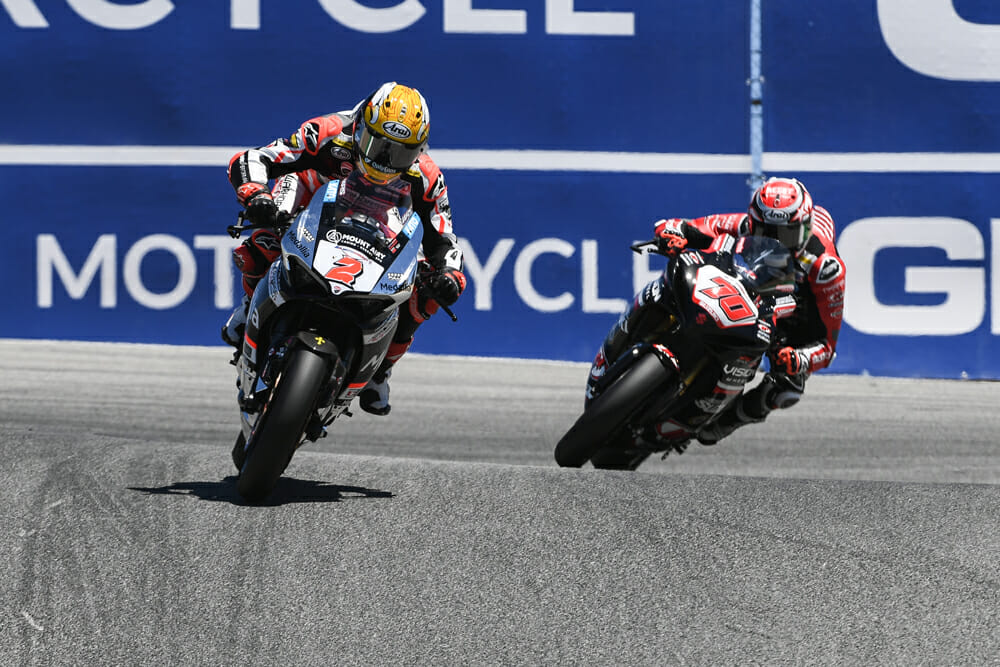 Race one at Laguna was a cat-and-mouse affair, with both Herrin (2) and Scott (70) taking turns at the front.
Race one at Laguna was a cat-and-mouse affair, with both Herrin (2) and Scott (70) taking turns at the front.
How has life been with the M4 crew?
Working with everyone is great. Robbie Peterson, my mechanic, Dustin, Remy, the data guy we have. We have a new one this week from World Supersport. I haven’t had any problems under the tent, really. Just mechanical stuff here and there.
Tell us about the family business.
We have a dealership up in Pennsylvania, around the Coopersburg area called Scott Powersports. We sell KTM, Yamaha, Honda, GasGas, Husqvarna, Kawasaki. Everything but Suzuki and Harley, basically.
We have some SSR now and Benelli. We also have Husqvarna’s electric mountain bikes. There’s something in the works for a new electric-motorcycle brand right now. So, it’s cool.
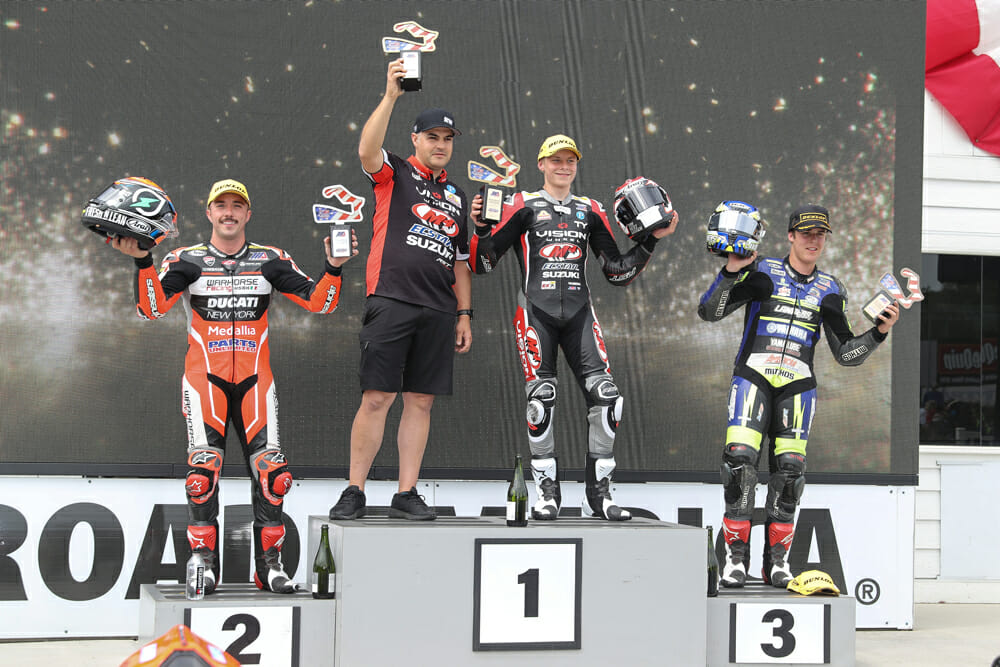 Vision Wheel M4 Ecstar Suzuki team manager Chris Ulrich shares the podium with his young charger Scott after his first Supersport win at Road America.
Vision Wheel M4 Ecstar Suzuki team manager Chris Ulrich shares the podium with his young charger Scott after his first Supersport win at Road America.
Do you work there during the year?
I’ll stop in here and there and work a few hours. We live in a farmhouse, so there’s always stuff to do at home.
Are you still in school?
I do school on the computer when we’re away. Now we’re in the summer break, so I don’t have school. It’s pretty easy on the computer. I just get it done before the race weekends and don’t have to worry about it.
Then on the drive home, I’ll just do a couple days’ worth. It’s straightforward. There’s not a lot of load with the school I’m in right now, so I can submit stuff a little late. There’re no deadlines and stuff like that. My school goes smoothly now. CN
